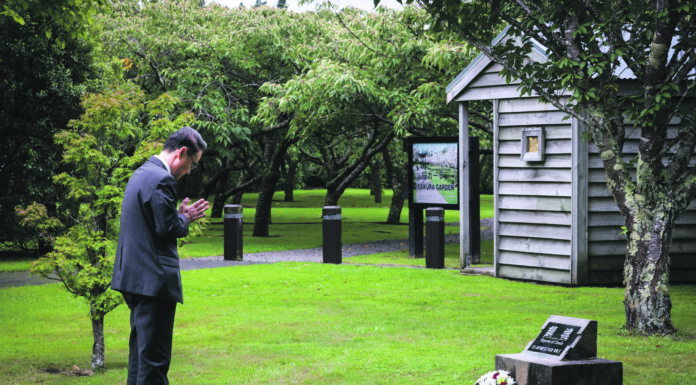Dignitaries from New Zealand, Japan, and Australia gathered to commemorate the 80th anniversary of the Featherston Incident, a riot which resulted in the deaths of 48 Japanese prisoners of war and a New Zealand guard.
The Saturday morning memorial service was held at the memorial garden north of Featherston, across from the site of the former camp.
About 100 people attended the commemoration, which included a powhiri from Mana Whenua, a Catafalque guard, speeches, and the laying of wreaths.
Wairarapa MP Kieran McAnulty said it was a moving event.
“We all reflected on the division and cultural misunderstanding that led to this tragic event.
“As we remembered a dark chapter in our region’s history, we look forward with a renewed commitment to inclusion, diversity, and peace,” McAnulty said.
Featherston RSA president Peter Jackson said that the RSA had become involved in the memorial services in the last five years.
“Some of our WWII veterans were not keen at all to be involved in the ceremony.
“It’s only in recent years, dare I say it, with the passing of some of those veterans, that we’ve been able to participate.
“I’m pleased as the RSA president to be able to help organise the event nowadays, and we hope to continue involvement going forward,” he said.
South Wairarapa mayor Martin Connelly said the ceremony showed the strong relationship between New Zealand and Japan.
“War is a terrible thing, and I express my gratitude to the governments of New Zealand and Japan that have worked hard since 1945 to develop mutual respect, replacing hostility with friendship and understanding.”
He said that the ceremony probably would never have happened a generation ago.
“My father was a prisoner of war, and he would never have forgiven the Japanese for what happened, so it’s up to the children and the grandchildren to try and make peace and forge a better world.”
Acting ambassador for Japan Tatsushi Nishioka said the service was part of the process of reconciliation between New Zealand and Japan.
“The memorial garden no longer symbolises the tragedy that occurred 80 years ago, but instead serves as a reminder of the progress towards reconciliation and appreciation that both Japanese and New Zealand people have made together,” he said.
The memorial garden has a plaque dedicated to the dead soldiers inscribed with the following poem:
Behold the summer grass
All that remains
Of the dreams of warriors.


